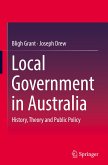This detailed account tells the background story of a privatised monopoly whose sharp practices embroiled a national government in scandal and shocked a nation that prides itself on the strength of its institutions. AWB Limited, the former Australian Wheat Board that in the 1990s was sold into the private sector, paid more than $US200m in kickbacks to the pariah regime of Saddam Hussein in Iraq, exploiting the provisions of the United Nations' Oil for Food program by inflating the price of the wheat it sent there to disguise the pay-offs that secured the contracts. The ensuing uproar threatened the careers of key cabinet ministers in the Howard government and contributed to the rise and subsequent election victory of the Australian Labor Party's Kevin Rudd.
Bitte wählen Sie Ihr Anliegen aus.
Rechnungen
Retourenschein anfordern
Bestellstatus
Storno








